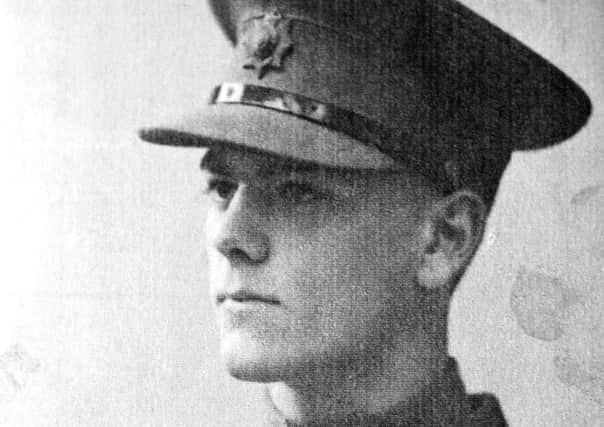Obituary: James Michael Symes, MC. soldier


Major James Michael Symes, soldier, winner of MC and Bar. Edinburgh-born Sir Donald MacGillivray, who as High Commissioner signed Malaya’s independence agreement in 1957, had British military successes to thank for being able to do so. The greatest of those – the destruction of a hidden Communist jungle training camp on 12 December, 1955 – was the work of Major James Symes.
No other single engagement by British forces since the early days of the Malayan Emergency in 1951 achieved so much. Symes, leading three platoons from the Royal Hampshire Regiment, nipped in the bud a Communist terrorist training camp that was being set up deep in the jungle under a senior rebel figure.
Advertisement
Hide AdAdvertisement
Hide AdAltogether 11 Communist terrorists, including the senior man, were killed, with one, a woman, captured, and documents, arms and ammunition seized.
Symes had led his men across a fast-flowing river in darkness. In the thick undergrowth progress was no more than 500 yards an hour and the journey took two days. Sounds carried easily: precautions such as removing metal bottle-tops were vital.
Their guide lost the trail. It was Symes who, discerning the sound of wood being chopped, located the camp. With extreme stealth, he placed two and a half of his three platoons around the camp. The soundless movement took four hours. Then, with his last dozen men, unnoticed by at least two sentries, he yelled “Charge!” and under cover of sten gun fire, led the assault. It lasted 30 minutes.
The one captive, furious, spat on the British soldier who tried to bandage her leg wound.
“I could understand her feelings,” Symes later reflected. “I had been a prisoner too.”
It was the Scots – not only MacGillivray, but also Sir Malcolm MacDonald, then Sir Robert Scott and Lord Selkirk as Commissioners General at Singapore – who continued to defend Britain’s heritage in South-east Asia after the Second World War, but the spirit of a proud Guernseyman, as Symes was, chimes with theirs.
The Channel Islander, educated at Elizabeth College, St Peter Port, where he had been captain of the cricket 1st XI, so greatly wished to maintain British help for his native rock, abandoned as indefensible and invaded by the Germans in 1940, that he volunteered to return as a spy.
The mission, in September 1940, with an old schoolfellow, Hubert Nicolle, who had also joined the Hampshires, was a success. The pair gathered important military information. But back in England, something went wrong, and despite their signalling from the beach over several nights, the motor torpedo boat that had been promised never came to pick them up.
Advertisement
Hide AdAdvertisement
Hide AdAfter seven weeks on the run, they had to surrender to save friends and families who sheltered them. They were sentenced to death, despite an agreement between the German commandant and the island authorities that they would be treated as prisoners of war. With 14 of those who had helped them, they were sent to Paris. Only in 1941 were the pair accorded PoW status. By then Symes’s father had died in jail.
Symes spent the rest of the war in seven German prison camps, and made several attempts to escape. He helped to dig tunnels on three of them. Once he dug for four months. The tunnel completed, he and others emerged into bushes – but were caught because a guard smelled the passageway’s dank air, and summoned colleagues.
In 1945, from Rotenburg an der Fulda, Symes was marched east as the Reich collapsed. On 13 April, he was liberated by the Americans.
The citation for his Military Cross, awarded in May 1945, says of the lost motor boat: “Attempts to re-embark him failed through no fault of his own… He showed great personal courage and gallantry.”
A fine linguist, he added Russian to his fluent French and German, and from 1946 served with the Intelligence Organisation Allied Commission Austria (British Element). His office was in Schonbrunn Palace, Vienna, and there he met Rosemary Leyson, a civilian intelligence officer. They married in 1947, and were to have two daughters, Madeleine and Sarah. His daughters survive him; Rosemary died in 2008.
The couple were stationed in Berlin during the blockade and airlift in 1948, when he worked for the British Commanders-in-Chief Mission to the Soviet Forces of Occupation, Germany. Occasionally, he recalled, an interpreter would be needed if a British aircraft came down in East German territory.
After a spell in Britain training National Servicemen destined for the war then going on in Korea, he was sent to Prague as assistant military attaché.
He once scared off a Communist minder by saying “This is the ghost of Stalin speaking” down the telephone in 1953, just after the Soviet dictator’s death.
His exploits in Malaya won him a Bar to his MC in 1956.
Advertisement
Hide AdAdvertisement
Hide AdIn the 1960s he returned to Germany, and completed a two-year course at German Staff College in Hamburg, as well as revising the British military attache’s handbook on the German Army. He worked at the Ministry of Defence, then at Nato’s Allied Forces Northern Europe headquarters near Oslo, Norway, where he helped plan large military exercises. He retired in 1971. “After the war I was a staff officer my whole life,” he declared. “I enjoyed it.”
Anne Keleny